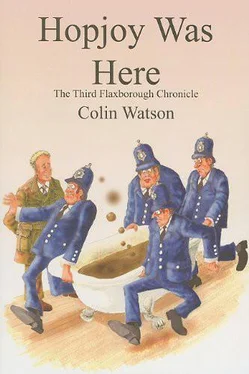Purbright rose abruptly from his desk and walked to the window. It was seldom that he felt annoyed with himself—or anyone else, for that matter—but now he experienced a strong temptation to punch a hole in the glass. There was something—some unwarrantable assumption or piece of credulity on his part—which had turned this whole case the wrong way round almost from the beginning. What the hell was it?
Hands in pockets, he prowled to the door, round his desk, again to the window. He thought back over a dozen interviews, peering again at faces and listening to voices in the hope of catching some hint of what had led him so hopelessly astray. The impression grew that a single cardinal error was responsible—his swallowing without question of a whopping lie. He concentrated on recalling the occasion most likely to have produced large lies—his first meeting with Gordon Periam.
And with Mrs Periam. Doreen. Doreen Mackenzie. The erstwhile ‘young lady’ of Brian Hopjoy, the girl whose sportive tendencies in mid-afternoon had so shocked observant Miss Cork...
Suddenly Purbright turned from the window. He snatched from his desk a large envelope that awaited posting to Periam and tore it open. He sought hastily among its contents for a letter in the spidery handwriting of a condoling aunt, glanced through it, and made for the door.
This time, Miss Cork did not ask her visitor in. She remained standing just inside the porch and looked at Purbright as if she had never seen him before. After only the tersest preamble, he launched from the doorstep the one question he had come to ask.
“Miss Cork, when you told me of writing a letter to Miss Mackenzie’s fiancé, did you mean Mr Hopjoy?”
She stared as she might at a detergent promoter who had gabbled an idiotic jingle and awaited some prescribed and equally inane response before handing her a pound.
“This is most important, Miss Cork. Was it Mr Hopjoy to whom you wrote that letter?”
“I don’t know what you mean. No, of course it wasn’t Mr Hopjoy. I wouldn’t”—the thin frame stiffened—“soil paper with that man’s name. It was Mr Periam she was engaged to. And had been for four years.”
“So it was Hopjoy with whom she...whom you saw...”
For a moment the woman’s eyes closed. The big nose twitched in confirmation of the unspeakable.
Purbright half turned, ready to leave. “I’m sorry if I’ve seemed rather stupid about this; I just wanted to make sure there was no misunderstanding.”
Miss Cork breathed with the slow self-control of the determinedly delicate. “But I really don’t see what there can have been to misunderstand. I told you that...that girl ”—a twisted mouthing of the one word tumbled Miss Mackenzie into a broth pot of precocious lust—“had been after poor Gordon practically since they were children.”
Purbright fingered the letter in his pocket. “As a point of interest, do you happen to know if Doreen Mackenzie ever had a nickname?”
“I know what they called her at the Sunday school. Probably other people called her it, too. Mackie. Sometimes just Mack.”
Once all the little elements of truth began, as it seemed, to surrender themselves, Purbright found their marshalling together into a whole and obvious exposition of what really had happened at Beatrice Avenue quite exhilarating.
Sensing the inspector’s mood, Sergeant Malley beamed avuncularly as he ushered in his hospital informant, friend of a friend, and as anxious to meet the obligations implied by that compelling relationship as he was, in his own phrase, “to do that supercilious bastard Harton one in the eye”.
Male nurse Peter Tewkes was a curly-haired, florid and robust young man whom impudent good nature had made popular with patients and, in axiomatic consequence, the despair of his superiors. He eyed Purbright approvingly, as if cataloguing him as an ambulent case, no bed pans or blanket baths, maybe beer in locker and good for a fourth at solo after night sister’s round. “Fire away, sir,” he invited.
“It was very good of you, Mr Tewkes, to come along and help us. I need hardly tell you that we are not seeking this information out of idle curiosity.”
Mr Tewkes raised his brow. What better motive, he seemed to ask, could there possibly be?
“You’ll remember a patient being admitted under the name of Trevelyan—Howard Trevelyan, I believe.”
“I remember him,” said Tewkes, “but I don’t think that was his real name.”
“Nor do I, but never mind. He’d had a fall, hadn’t he?”
“So we were told. That fitted his injuries anyway.”
“Ah,” Purbright said, “now those are what we should like to hear about. Can you oblige, Mr Tewkes?”
Tewkes gave a wide, easy shrug. “Why not? He had a ruptured liver, that’s what.”
“I see. And that made an operation necessary?”
“Oh, rather. Straight away. It’s a rather nasty thing, you know.”
“I imagine it is. And the operation itself—is it very drastic?”
“I don’t know that I’d call it that, exactly. The idea is simply to mend the thing, as you would a...well, a torn cushion, say. Sew it up.” Tewkes paused. “Mind you, I don’t mean to suggest the business is particulatly easy or straightforward. The biggest snag...I say, you don’t want a lot of technical stuff, do you?”
“Not if you can avoid it.”
“Right you are. I’m not awfully strong on jargon, anyway. The point is that livers don’t mend themselves like most other bits of insides, so the artificial repairs have to be permanent—that’s why they use non-soluble sutures—and they’ve got to be treated with a good deal of respect ever after.”
“I follow. Now I’ve been told that this man came out of hospital in reasonably frisky condition. Is that likely, in your opinion? Would he have been able to...well, to lift heavy weights, for instance?”
Tewkes grinned. “The only thing he’ll be lifting for a bit will be a glass, and he’d better not make too regular a habit of that, either.”
“I don’t fancy he will,” said Purbright soberly. He remained thinking awhile, then pulled open a drawer of the desk.
“You mentioned just now something you called non-soluble sutures. Would they be made of nylon?”
“I believe they are, as a rule, yes.”
“Have a look at that, will you?” The inspector placed before Tewkes the small glass tube bequeathed by Sergeant Warlock.
Tewkes held the tube to the light and squinted at the fine, yellowish-white strand it contained. “Could be, certainly. Where did you get it?”
Purbright was so pleased with Mr Tewkes that he nearly rewarded him there and then with a true and full answer. Deciding after all that really wouldn’t do, he said simply: “It was stuck in a drainpipe.”
Tewkes wrinkled up one eye. “Stuck in a...”
Purbright nodded.
“But how bloody queer!” Tewkes gazed again at the tube, turning it this way and that in his big hands. He looked up and smiled. “Go on—I’ll buy it.”
Purbright returned his grin, a little apologetically, and reached for the tube. “Sorry. The price is too high, Mr Tewkes. Far too high.”
Chapter Seventeen
“But the lounge, sergeant...the lounge! He can’t be left in the lounge!”
Sergeant Love, who was feeling by no means happy himself, found the distraught manager of the Neptune increasingly hard to bear.
“Now look, Mr Barraclough, I regret this as much as you do—perhaps more, because I feel a bit to blame—but what’s done is done. The inspector will be here very soon and he’ll make all the decisions. In the meantime everything must be left exactly as it is.”
“But it’s nearly six o’clock.”
Читать дальше

![Fredrik Backman - Britt-Marie Was Here [Britt-Marie var här]](/books/61260/fredrik-backman-britt-marie-was-here-britt-thumb.webp)










